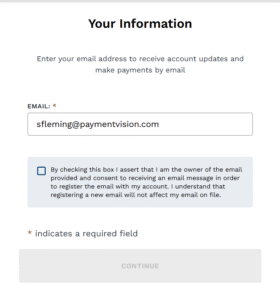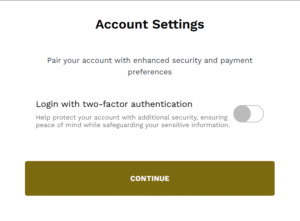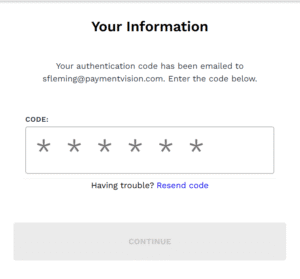PayWeb360 v1.20 is now available in production. The purpose of this release is to enhance 4 features (Email Registration, Linked Accounts, Balance Presentment, Single Sign-on), and fix 23 bugs (Email Registration, Linked Accounts, Balance Presentment, Single Sign-on, Web Accessibility, Card Payments, Digital Wallets, Login, Settlement Offers, Payments-in-full, Payment Amount).
Email Registration
Onboarding
Customers currently initiate the Email Registration process within their user profile or in response to a call-to-action within the site. Now, customers can be required to register an email address after logging in. Customers will continue to have the ability to opt-out by either clicking that link or changing their user profile settings. 2-Factor Authentication (2FA) will continue to be optional.
Why require users to register an email address?
- Users expect to communicate electronically
- Email reminders help prevent late/NSF fees
- It’s less expensive to satisfy compliance requirements (e.g.; intent to deposit notices) with email than print mail
How does it work?
- When a user logs into PayWeb360 and they have not already registered or unregistered an email address, they are required to enter an email address in order to Continue
- After entering an email address and clicking Continue, a registration code is emailed and a 2FA call-to-action is presented
- After making a 2FA selection and clicking Continue, an email registration code entry screen is presented
- After entering the code and clicking Continue, PW360 validates the code.
- If valid,
- the email address is registered to the user
- the user is opted into Payment Notifications
- the user is opted into 2FA (if enabled)
- the landing page is presented
Call-to-Action
Prior to this release, the Email Registration call-to-action would not be presented in cases where the customer was unknown to the system. This has been fixed.
Linked Accounts
Multiple Payees
Prior to this release, users were restricted from being able to login when the payees were different. Now, they will be able to login.
Limitations
- PayWeb360 cannot be configured at the payee level when linking accounts with different payees
- While payees can be different when linking accounts, they cannot be different when packeting them
Packet Navigation
Prior to this release, clicking View on the Make Payment page launched an Account Detail screen representing the packet. Now, clicking View will launch the Dashboard page.
Before
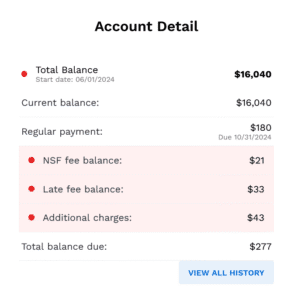
After
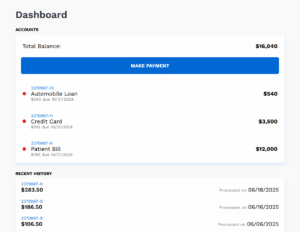
Why are we making this change
The Dashboard is a more appropriate representation of the detail of a packet.
Account Name
Prior to this release, Total Balance was presented as the balance label when viewing the detail of a packet member. Now, a configurable account name will be presented.
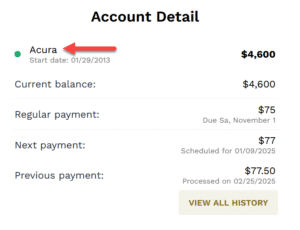
Language Preference
Prior to this release, an issue prevented a language preference change from being applied to the payment method when switching between linked accounts. This has been fixed.
Original Creditor
In version 1.17 we added the ability to present the original creditor and account number on the Account Detail screen. Now, it can be presented in packet mode.
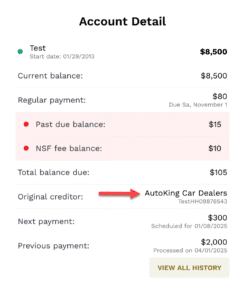
Balance Presentment
Hide Balance
Prior to this release, when configured to hide the balance, PayWeb360 also hid the automatic payment option. Now, PayWeb360 can be configured to hide the balance without hiding the automatic payment option.
Use Case
| Lease Purchase Agreement | Automatic payment is a popular payment option; however, because customers are given discounted early pay off amounts (“EPO”), the balance is not an accurate payoff amount. |
Limitations
| Packet Accounts | The ability to present the automatic payment option while hiding the balance is limited to single accounts and non-packeted linked accounts only. Packeted accounts are out-of-scope. |
| Payee Configuration | Hide Balance is only configurable at the tenant level. It is not configurable at the payee level. |
Help Text
Clients can now append a disclosure to the additional balances sub-text on the Make Payment page.
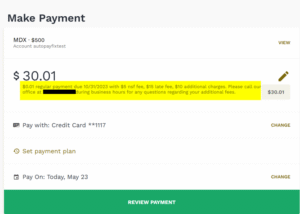
Decimals
Prior to this release, an issue caused additional balances to display decimals when they end in .00. To make them consistent with the way we present other amounts, decimal places will no longer be presented when the amount ends in .00.
Single Sign-on
What’s new
| Down Payments | Prior to this release down payment amounts, while pre-populated, were editable. They are no longer editable. |
| Repo Payments | Prior to this release repo payment amounts were not pre-populated. Now they are pre-populated and cannot be edited. |
Why are we making this change
Down payment and repo payment amounts are fixed in nature.
Recurring Payments
The following Recurring Payment issues were fixed as part of this release.
| Repo Payments | Prior to this release, the recurring payment option was presented in a repo payment scenario. Since it is not applicable, it has been removed. |
| Cancellation | Prior to this release an issue prevented Single Sign-on users from cancelling recurring payments. This has been fixed. |
Web Accessibility
The following web accessibility issues have been fixed as part of this release:
- Fixed a color contrast issue on various drop-down lists
- Fixed a hover text issue on various user interface elements
- Removed an unnecessary tool-tip
Card Payments
Prior to this release an issue caused unknown card types to be presented as credit cards on the Verify Payment screen. They will now be presented, generically, as payment cards.
Digital Wallets
Prior to this release an issue caused Google and Apple Pay payments to fail when the authorize payment panel is configured to be hidden on the Verify Payment screen. This has been fixed.
Login
- Prior to this release, an issue caused the Login button to be disabled in some cases after a failed login attempt. This has been fixed.
- Prior to this release, an issue prevented enforcement of case sensitivity on the login password. This has been fixed.
Settlement Offers
The following Settlement Offer formatting issues were fixed as part of this release:
- We added a comma to separate thousands when presenting settlement offer amounts to be consistent with the way other amounts are presented
- Prior to this release, a settlement offer was presented without a space between the offer label and amount in cases where the label exceeded a certain length. This has been fixed.
Payments-in-full
Prior to this release, an issue prevented us from auditing Payments-in-full. This has been fixed.
Payment Amount
Prior to this release an issue caused the minimum payment amount to be displayed incorrectly in a certain configuration. This has been fixed.

